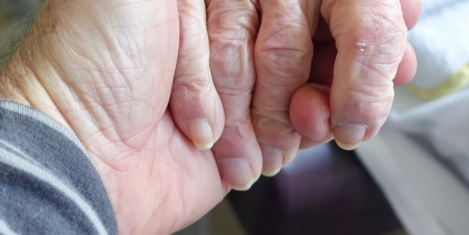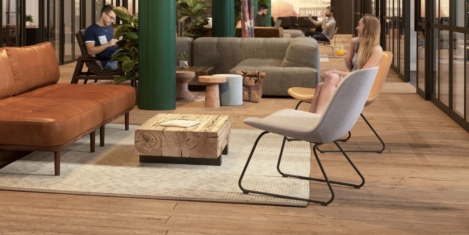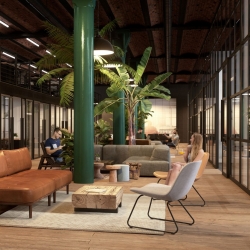To provide the best experiences, we use technologies like cookies to store and/or access device information. Consenting to these technologies will allow us to process data such as browsing behaviour or unique IDs on this site. Not consenting or withdrawing consent, may adversely affect certain features and functions.
The technical storage or access is strictly necessary for the legitimate purpose of enabling the use of a specific service explicitly requested by the subscriber or user, or for the sole purpose of carrying out the transmission of a communication over an electronic communications network.
The technical storage or access is necessary for the legitimate purpose of storing preferences that are not requested by the subscriber or user.
The technical storage or access that is used exclusively for statistical purposes.
The technical storage or access that is used exclusively for anonymous statistical purposes. Without a subpoena, voluntary compliance on the part of your Internet Service Provider, or additional records from a third party, information stored or retrieved for this purpose alone cannot usually be used to identify you.
The technical storage or access is required to create user profiles to send advertising, or to track the user on a website or across several websites for similar marketing purposes.
 More than 40 percent of workers have a hidden health issue they’ve never disclosed to their employers, with younger employees the most likely to withhold information from their bosses, according to new research. A survey of 1,000 employees, carried out by healthcare provider Benenden Health, revealed 63 percent of respondents aged 23 or under and 60 percent of 24-38-year-olds surveyed haven’t told their employers about a health issue. This is compared to 35 percent of respondents aged 39-54 and 18 percent of those aged 55 or over. (more…)
More than 40 percent of workers have a hidden health issue they’ve never disclosed to their employers, with younger employees the most likely to withhold information from their bosses, according to new research. A survey of 1,000 employees, carried out by healthcare provider Benenden Health, revealed 63 percent of respondents aged 23 or under and 60 percent of 24-38-year-olds surveyed haven’t told their employers about a health issue. This is compared to 35 percent of respondents aged 39-54 and 18 percent of those aged 55 or over. (more…)






 Over the last 12 months, seven in 10 UK business leaders witnessed presenteeism, where someone come into the office when they are unwell, a survey has claimed. The issue is particularly prevalent at certain times of the year, recruitment firm
Over the last 12 months, seven in 10 UK business leaders witnessed presenteeism, where someone come into the office when they are unwell, a survey has claimed. The issue is particularly prevalent at certain times of the year, recruitment firm 
 Some 47 percent of employees who care for both children and elderly relatives (sandwich carers) are keeping these responsibilities hidden from their employer, a survey from
Some 47 percent of employees who care for both children and elderly relatives (sandwich carers) are keeping these responsibilities hidden from their employer, a survey from 
 Three-quarters of UK employees who have experienced a mental health condition believe stigma around the issue has reduced over the past year but the vast majority would still not discuss their condition with their line managers, according to new research. Aviva’s “Health of the Workplace” report, released for Time to Talk Day, suggests that just 9 percent of employees who have had a mental health condition sought help from their line manager, 12 percent would discuss their condition with a work colleague and only 4 percent would talk to HR.
Three-quarters of UK employees who have experienced a mental health condition believe stigma around the issue has reduced over the past year but the vast majority would still not discuss their condition with their line managers, according to new research. Aviva’s “Health of the Workplace” report, released for Time to Talk Day, suggests that just 9 percent of employees who have had a mental health condition sought help from their line manager, 12 percent would discuss their condition with a work colleague and only 4 percent would talk to HR. 




 More than 600 business and HR leaders gathered at London’s Hilton on Park Lane on 30 January 2020 as the
More than 600 business and HR leaders gathered at London’s Hilton on Park Lane on 30 January 2020 as the 


 Following reports that job applications on the first working Monday of the New Year spiked by 89 percent compared to the average Monday in December, many UK businesses may be missing a trick in their efforts to retain staff, new research has suggested. When researchers commissioned by
Following reports that job applications on the first working Monday of the New Year spiked by 89 percent compared to the average Monday in December, many UK businesses may be missing a trick in their efforts to retain staff, new research has suggested. When researchers commissioned by 
 Getting on well with colleagues gives workers greater job satisfaction than having a good salary, new research has claimed. “
Getting on well with colleagues gives workers greater job satisfaction than having a good salary, new research has claimed. “
 An 1860s warehouse located in the original Granada Studios estate in Manchester city centre has opened its doors as a coworking space for small and medium businesses.
An 1860s warehouse located in the original Granada Studios estate in Manchester city centre has opened its doors as a coworking space for small and medium businesses. 







February 5, 2020
Bridging the gap between the reality and perception of engagement
by Callum Gill • Comment, Flexible working, Technology, Workplace